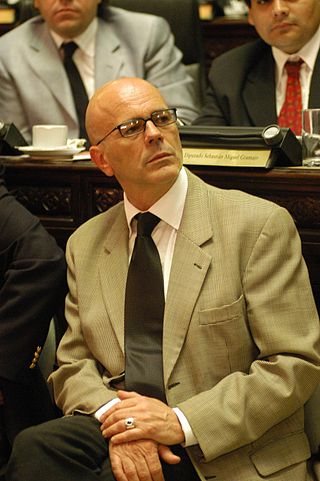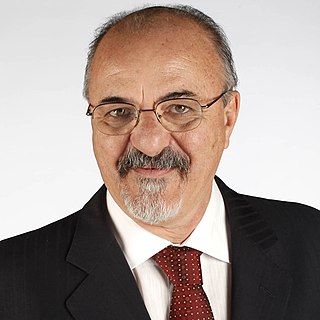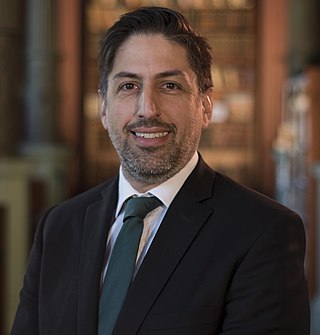Alberto Estanislao Sileoni (born 1952) is an Argentine academic and policy maker who served as a former Minister of Education.
Alberto Sileoni enrolled in the University of Buenos Aires and earned a degree in History,in 1975. He later taught the discipline at his alma mater,and in 1993,was named Director of Adult Education Services for the City of Buenos Aires. He was shortly afterwards appointed the city's Undersecretary of Education,remaining in the post until the election of Mayor Fernando de la Rúa,in 1996. [1] [2]
Sileoni was transferred to the National Education Ministry,where he directed the Education and Work Project. The election of Mayor de la Rúa as President in late 1999 resulted in the project's replacement and Sileoni's appointment as Director of Secondary Education and Undersecretary for Buenos Aires Province Governor Carlos Ruckauf. [1]
The election of a center-left Peronist,Néstor Kirchner,resulted in Sileoni's appointment as Vice Minister of Education in June 2003,a post he held until Minister Daniel Filmus transferred him to the City of Buenos Aires,in March 2006. He served as Education Minister for Mayor Jorge Telerman until Filmus declared his candidacy for Mayor,in early 2007;considering his friendship with Filmus a potential conflict of interest (when Mayor Telerman sought reelection),Sileoni resigned in February of that year. [3]
The election of Kirchner's wife,Senator Cristina Fernández de Kirchner as President in late 2007 resulted in Sileoni's appointment as second-in-command for Education Minister Juan Carlos Tedesco,a UNESCO official. A disappointing showing in the June 2009 mid-term elections en 2009 and a subsequent cabinet-shake-up,however,led to Sileoni's appointment as Education Minister in replacement of Tedesco,who was made Director of the Ministry's Planning and Evaluation Unit. [4]

Eduardo Alberto Duhalde is an Argentine former peronist politician who served as the interim President of Argentina from January 2002 to May 2003. He also served as Vice President and Governor of Buenos Aires in the 1990s.

Adolfo Rodríguez Saá is an Argentine Peronist politician. Born in a family that was highly influential in the history of the San Luis Province, he became the province's governor in 1983, after the end of the National Reorganization Process military dictatorship. He remained governor up to 2001, being re-elected in successive elections.

Raúl Ricardo Alfonsín was an Argentine lawyer and statesman who served as President of Argentina from 10 December 1983 to 8 July 1989. He was the first democratically elected president after the 7-years National Reorganization Process. Ideologically, he identified as a radical and a social democrat, serving as the leader of the Radical Civic Union from 1983 to 1991, 1993 to 1995, 1999 to 2001, with his political approach being known as "Alfonsinism".

Carlos Ernesto Soria was an Argentine lawyer and Justicialist Party politician who served as governor of Río Negro Province from December 10, 2011, until his assassination.

Aníbal Ibarra is an Argentine lawyer and politician who served as mayor of Buenos Aires.

Jorge Telerman is an Argentine politician and journalist. He was the fourth Chief of Government of Buenos Aires City, replacing Aníbal Ibarra between 2006 and 2007. He was previously Vice-Chief of Government, National Secretary of Culture, and Ambassador.

Daniel Fernando Filmus is an Argentine politician and academic, who served as the country's Minister of Science, Technology and Innovation, from 2021 to 2023.

Jorge Enrique Taiana is an Argentine Justicialist Party politician who served as the country's Minister of Defense from 2021 to 2023. Taiana previously served as Foreign Minister in the administrations of President Néstor Kirchner and his successor, Cristina Fernández de Kirchner, from 2005 to 2010, and as a National Senator for Buenos Aires from 2019 to 2021.

Argentina held national presidential and legislative elections on Sunday, 28 October 2007, and elections for provincial governors took place on staggered dates throughout the year. For the national elections, each of the 23 provinces and the Autonomous City of Buenos Aires are considered electoral districts. Voter turnout was 76.2%. Buenos Aires Province Senator and First Lady Cristina Fernández de Kirchner of the Front for Victory won the election by 45.28% of votes against Elisa Carrió of Civic Coalition ARI, making her the second female president of Argentina and the first female president to be directly elected. She broke the 40 percent barrier and won in the first round. Elisa Carrió won in the city of Buenos Aires and came second with more than 20 percent of the votes. Third was Roberto Lavagna, who won in Córdoba.

Carlos Alfonso Tomada is an Argentine Peronist politician who served as the country's Minister of Labour, Employment, and Social Security from 2003 to 2015, having first been appointed by former President Néstor Kirchner, and reappointed by President Cristina Fernández de Kirchner. Since 2020 he has been Argentina's ambassador to Mexico.

Carlos Rafael Fernández is an Argentine economist and was, from April 2008 to July 2009, the Minister of the Economy of the country.

Juan Carlos Tedesco was an Argentine academic and policy maker who was the President's Education Minister, from December 2007 to July 2009.

Margarita Stolbizer is an Argentine lawyer and politician. Originally a member of the Radical Civic Union (UCR), she founded her own party, Generation for a National Encounter (GEN) in 2007. She has been a member of the Chamber of Deputies of Argentina on three occasions: from 1997 to 2005, from 2009 to 2017, and since 2021.

Julián Andrés Domínguez is an Argentine Justicialist Party politician of the Justicialist Party. He was twice Minister of Agriculture, in the cabinets of presidents Alberto Fernández (2021–2022) and Cristina Fernández de Kirchner (2009–2011).

Juan Manuel Abal Medina is an Argentine academic, political scientist, and author. He was appointed Communications Secretary by President Cristina Fernández de Kirchner in 2011, and served as Chief of the Cabinet of Ministers of Argentina from December 2011 to November 2013. He was a national senator for Buenos Aires Province from 2014 to 2017.
The following lists events that happened or will happen in Argentina in 2019.

Santiago Andrés Cafiero is an Argentine political scientist and politician, currently serving as a National Deputy elected in Buenos Aires Province. He previously served as Minister of Foreign Affairs and Worship (2021–2023) and as Cabinet Chief (2019–2021) in the cabinet of President Alberto Fernández.

Nicolás Alfredo Trotta is an Argentine politician. He was Argentina's Minister of Education from 10 December 2019 to 20 September 2021, in the cabinet of President Alberto Fernández.

Mara Brawer is an Argentine psychologist and politician, currently serving as National Deputy elected in the Federal Capital since 2019. She had previously served in the same position from 2011 to 2015. A member of the Justicialist Party, Brawer sits in the Frente de Todos bloc.

Juan José "Juanjo" Álvarez is an Argentine former politician. He held a number of important posts throughout his career, serving as the first intendente (mayor) of Hurlingham Partido from 1995 to 2001, as Minister of Justice during the presidency of Eduardo Duhalde from 2002 to 2003, and as a National Deputy from 2003 to 2011.





















